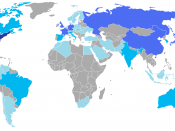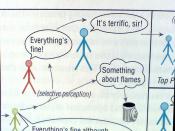Many theories demonstrate insight into the concept of war, international relations and domestic relations. Realism and liberalism provide pictures that relate and coexist, yet are opposite in theory. Realism is conservative and pessimistic. Realists plan for permanence of the current international state of affairs. Liberalism is progressive and optimistic. Liberals believe change is necessary and inevitable. Neither viewpoint gives us the right or wrong side as both contain truths depending on circumstances. International politics relies on all players in order to be complete. No one theory or example can cover all situations. Realist and liberalist theories provide contrasting views on actors, goals, and instruments of international affairs.
Realism and liberalism define the actors within international relations differently from each other. Realists tell us that only powerful, larger states are true actors in international politics. Liberals believe that states are the central players but there are many other actors to consider.
The role of actor from some liberalist views includes individuals and corporations crossing international borders and binding together as another entity, the global community. In addition, contemporary times shows us that many powerful groups such as terrorist cells are real players in international affairs. Realism explains that power is held and maintained by the states. Even if this proves true, other entities control situations that change how states interact.
Realists and liberals both agree that the actors of both theories desire power. However, each side views the method for obtaining and maintaining power differently. The realist claims that power comes from military dominance by state over state. Therefore, war and the struggle for power becomes the realist's key dilemma. Liberals open up the concept of power to include trade, corporate agreements and individual contracts. Many states obtain great power through trade and would not be able to win a military...


